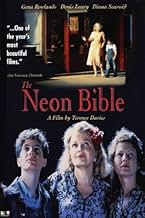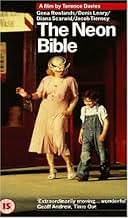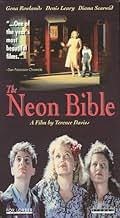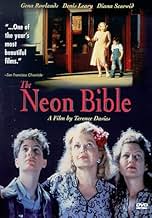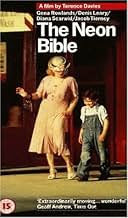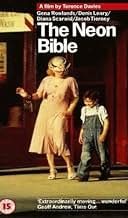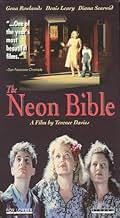अपनी भाषा में प्लॉट जोड़ेंWhile on a train, a teenage boy thinks about his life and the flamboyant aunt whose friendship acted as an emotional shield from his troubled family. This film evokes the haunting quality of... सभी पढ़ेंWhile on a train, a teenage boy thinks about his life and the flamboyant aunt whose friendship acted as an emotional shield from his troubled family. This film evokes the haunting quality of memory while creating a heartfelt portrait of a boy's life in a rural 1940s Southern town... सभी पढ़ेंWhile on a train, a teenage boy thinks about his life and the flamboyant aunt whose friendship acted as an emotional shield from his troubled family. This film evokes the haunting quality of memory while creating a heartfelt portrait of a boy's life in a rural 1940s Southern town.
- पुरस्कार
- 1 जीत और कुल 2 नामांकन
फ़ीचर्ड समीक्षाएं
But this is horrifically off the mark.
The review of Davies' version of Edith Wharton's *House of Mirth* in the NY Times said that the movie was more like Charles Dickens than Edith Wharton. Which is exactly the criticism I had of this movie. These folks are not embodying American Southern farmers, they're acting like industrial working class people. I can understand and be sympathetic to the original story: my people, coming from South Carolina & Georgia, had lives very similar to the plot of this movie. Therefore, I could see where this could potentially be a very good film.
But nothing gets under my skin like an inability to see beyond one's own cultural bias...which is the major mistake of the director of this production. If you take the emotions, the gestures, the imagery of this film and put them in an industrial landscape, it would be an OK movie. But having people interact and react this way and have them being farmers in the Deep South is bogus, phony and w-a-y off the mark. If you want to see true southern Americana, skip this movie and see Elia Kazan's *Wild River* instead...
The problem lies entirely at the feet of director Terence Davies . He directs in a poetic style or at least attempts to but where as a poetic film by Terewnce Malik or Sam Mendes works here it spectacular fails . . What sinks the film is the unnatural framing where a character is smack bang in the middle of the screen facing the camera . A lot of critics complain that a director like Danny Boyle shoots , frames and edits films in a similar manner but at least he brings a sense of variety to his movies . Here however Davies relies on the exact same framing technique throughout the entire film which sinks it as a cinematic presentation and feels more like a filmed theater play
Davies is also, in my opinion, one of the few directors who accurately depicts the act of remembering. Without giving anything away, it's always important to keep in mind that David is on a train, thinking and remembering. No one remembers something from the past totally, memory functions like fragments and it's up to us to flesh them out. Sometimes we think of something one way, later another away; forget, remember or distort. David is fleshing out the events of his life and that's th most important thing about the film. Sometimes we remember minute, isolated events... Davies puts those in the film as well. Just sit back and enjoy the pace of this remarkable film from an equally remarkable and brilliant director.
A sheet blowing - music from Gone With the Wind - he turns into high drama; Stephen Foster's 'Hard Times' as David begins to hit bottom. It IS a musical - Davies has always used music for forward his narrative and uses it in this film in a more sophisticated way than in his earlier films to even more startling effect.
Everyone turns in remarkable performances - the entire cast and the photography is beyond amazing. Davies is the master of the tracking shot.
Please, be patient with the pace of the film - sit back and enjoy the ride. Get used to the rhythms and then give all of yourself to the film, jump in. It's beautiful, melancholy and sad. Davies' films are always so full of life and this is no exception. No idea why this film gets a bad rap - hands down, one of the greatest films of the 1990s. It's totally unique - it comes from nowhere. Shots, colors, textures - all perfect. Everything. Enjoy the ride.
It is dreamy, corny, beautifully set-staged, almost, but its subject matter isn't. It traipses along as if in a trance, we are either taken in by its beauty or it just passes by, languidly, slowly, and yes, boringly.
I can't remember if anyone swore. There was blood, otherwise what happened? People sang quite a lot, embarrassingly, at times, otherwise one contrived scene floated into the next. True, I've not read the book, so cannot compare.
I think it could work if perhaps if it was written by Harold Pinter and directed like a Dennis Potter - jet black, violent and maybe then, memorable.
As it is, it's soppy, attempting to be different, where being different is like being different in the school playground; it looks odd, that oddness showing up over any potential good and thus making the film simply not work.
Edward Guthmann said the film was poorly received when it premiered at Cannes, but called it "gorgeous" and "one of the year's most beautiful films." He said it was a rewarding film that requires a little faith from the viewer due to long, slow, "lingering shots that work as a kind of meditation." He described the revival meeting at night "like an Edward Hopper or Thomas Hart Benton painting come to life." I will grant the film that it looks beautiful, but it lacks a deeper substance which would be necessary to make this a great film.
Director Terence Davies said "The Neon Bible doesn't work, and that's entirely my fault. The only thing I can say is that it's a transition work. And I couldn't have done The House of Mirth without it." I appreciate that he is humble enough to admit this is not his best work. Again, the film looks brilliant, so it's far from a complete failure. And you have to respect the brave casting decision that brought Denis Leary, not known for his subtle acting, on board.
क्या आपको पता है
- ट्रिवियाIn an interview with "Time Out Film", Terence Davies said about this film, "[It] doesn't work, and that's entirely my fault. The only thing I can say is that it's a transition work. And I couldn't have done The House of Mirth (2000) without it."
- भाव
David, aged 15: If you were different from anybody else in town, you had to get out. They used to say in school, "you have to think for yourself," but you couldn't do that in town. You have to think what your father thought and that was what everybody thought.
- कनेक्शनFeatured in Fandor: Cannes You Dig It? | Fandor Spotlight (2022)
- साउंडट्रैकOh Lord, How Long?
Traditional
टॉप पसंद
- How long is The Neon Bible?Alexa द्वारा संचालित
विवरण
बॉक्स ऑफ़िस
- US और कनाडा में सकल
- $78,072
- US और कनाडा में पहले सप्ताह में कुल कमाई
- $5,045
- 3 मार्च 1996
- दुनिया भर में सकल
- $78,072
- चलने की अवधि1 घंटा 31 मिनट
- रंग
- ध्वनि मिश्रण
- पक्ष अनुपात
- 2.35 : 1
इस पेज में योगदान दें


